Top Stories
#NigeriaDecides: What CNN Is Saying About Nigeria’s 2023 General Elections
#NigeriaDecides: What CNN Is Saying About Nigeria’s 2023 General Elections
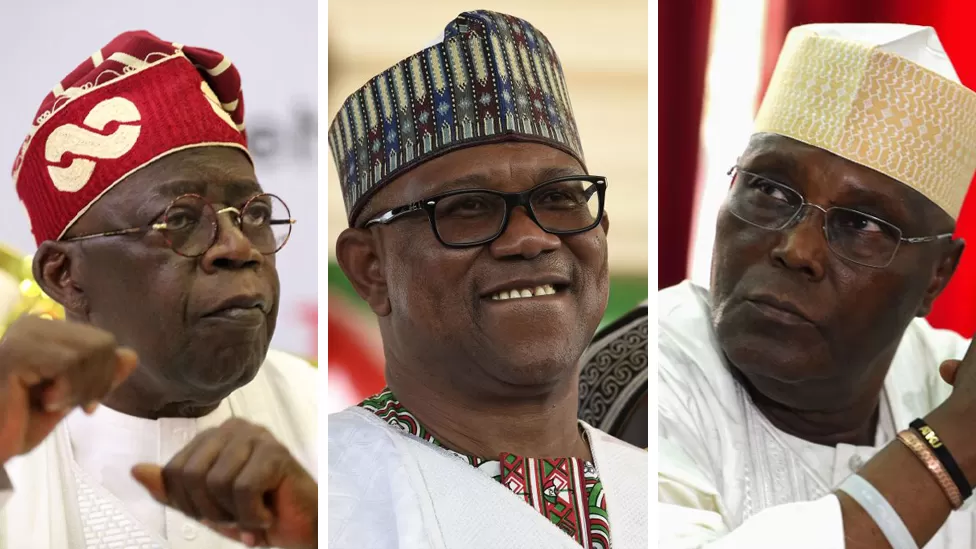
Nigeria is about to hold Africa’s largest democratic exercise. Here’s what to know about its presidential election.Nigeria is about to hold Africa’s largest democratic exercise. Here’s what to know about its presidential candidates.
Here’s what to know about Nigeria’s presidential election
Nigerians will head to the polls Saturday in a fiercely-contested presidential vote that analysts say is too close to call. It will be the largest democratic exercise on the continent as Africa’s most populous nation picks a new president.
The crucial election comes as the country battles myriad economic and security problems that range from fuel and cash shortages to rising terror attacks, high inflation, and a plummeting local currency.
For the first time since the country’s return to democratic rule in 1999, none of the candidates is an incumbent or a former military leader. Outgoing President Muhammadu Buhari is term-limited and will step down amid a patchy legacy that has brought “a lot of frustration and anger” to Nigerian voters, analysts say.
Who are the candidates?
Eighteen candidates are in the running for Nigeria’s highest office, each confident they can turn the country’s fortunes around if voted into power, but opinion polls suggest three are leading the race for the popular vote.
One of the key contenders is Bola Ahmed Tinubu, the candidate of Buhari’s party, the All Progressives Congress (APC). Another is the main opposition leader and former vice president Atiku Abubakar, of the People’s Democratic Party (PDP).
Nigeria’s presidential elections have typically been two-horse races between the ruling and opposition parties, but this year’s vote has a third strong contender, Peter Obi, who is running under the lesser known Labour Party.
Tinubu, 70, a former governor of Nigeria’s wealthy Lagos State, wields significant influence in the southwestern region where he is acclaimed as a political godfather and kingmaker.
The affluent political veteran, boasts of aiding the election of Buhari to the presidency on his fourth attempt in 2015, after three previous unsuccessful bids. Bola Ahmed Tinubu, foreground right, presidential candidate of the All Progressives Congress, Nigeria ruling party, during an election campaign rally.
After decades as a political puppet master, Tinubu declares it is now his turn to emerge from the shadows into the presidency; his campaign slogan is “Emi Lokan,” which translates to “it is my turn,” in his native Yoruba language.
The ruling party candidate has, however, been dogged by allegations of graft which he strongly denies. Critics say he has also not convincingly addressed concerns about his health, and has, at times, appeared confused and incoherent on the campaign trail. He has also made gaffes that have made him the butt of jokes and viral memes on social media.
Tinubu has also come under criticism for abstaining from presidential debates and delegating questions about his manifesto to members of his team during a recent outing at the UK think tank Chatham House.
One of Tinubu’s main challengers is the opposition party’s Abubakar, who is running for the sixth time following five previous losses. Candidate of the opposition Peoples Democratic Party (PDP) Atiku Abubakar during a campaign rally in Kano, northwest Nigeria.
Abubakar, 76, who served as vice president from 1999 to 2007, is a staunch capitalist who made his fortune investing in various sectors in the country. The tycoon has been investigated for corruption in the past. However, he denies any wrongdoing.
Many believe Abubakar’s presidential ambition might usurp an unofficial arrangement to rotate the presidency between Nigeria’s northern and southern regions, since he is from the same northern region as the outgoing leader, Buhari.
Nigerian presidential candidate Peter Obi on his plans to transform Nigeria’s economy. Peter Obi is a two-time former governor of Anambra State who is being touted as a credible alternative to the two major candidates.
Obi eschews the excesses of the typical ‘African Big Man’ leader He shuns a large entourage, flies economy class and carries his own luggage. His “no frills” approach has attracted hordes of supporters, mostly young Nigerians who call themselves ‘Obidients.’
Obi is also the only Christian among the leading candidates. His southeastern region has yet to produce a president or vice president since Nigeria returned to civil rule in 1999.
The ruling party’s Tinubu, although from the religiously mixed southwestern part of the country, is a Muslim and also chose a Muslim running mate, fueling public anger over his choice.
Described by Tinubu as “Mr. Stingy,” Obi, 61, is famed for his frugal approach and is seen as a ‘Mr Clean’ of Nigerian politics. However, his offshore accounts were among those found in the Pandora Papers, which exposed the hidden riches of the global elite in 2021. Obi denies any wrongdoing.
Will elections hold?
The past two elections have been postponed at short notice and there are fears this one will suffer the same fate. However the electoral commission insists there will be no disruptions.
Prof. Kingsley Moghalu, a political economist and former presidential candidate in the 2019 election told CNN he expected a high turnout, “except if suppressed by a security breakdown of any sort,” he told CNN.
More than 93 million Nigerians are registered to vote but uncertainty hangs over voter turnout on polling day, with insecurity among the biggest concerns. Public policy analyst Abideen Olasupo told CNN the uncertainties surrounding this year’s elections have put off many voters.
“Nigerian voters are currently the most disturbed and confused voters in the world right now because they are not sure if the election will hold; and if it will hold, they are not sure if the process will not be manipulated,” Olasupo said.
Nigeria delays plans to replace its banknotes after chaotic scenes at ATMs. Citizens have also been disrupted by an attempt to curb vote buying by making the old currency notes useless to prevent rogue politicians from stockpiling cash. But there are fears shortage of the new naira notes could disrupt the elections itself.
Electoral body INEC reportedly warned that the inability of banks to distribute enough of the new cash could make it difficult to pay temporary staff and security guards needed to operate thousands of polling stations for presidential and parliamentary elections on Feb. 25.
As it is, voting will not take place in more than 200 polling units across Nigeria, in places such as Imo and Taraba (two of Nigeria’s conflict-prone states) says INEC, because of concerns over security.
Separatist gangs and marauding gunmen known locally as bandits have terrorized parts of the country through kidnappings for ransom. Elsewhere, other impediments threaten voter turnout as some Nigerians are yet to collect their permanent voter’s card (PVC) with less than a week to the poll.
What are the issues?
The co-founder and head of intelligence at data company Stears, Michael Famoroti, tells CNN that critical issues around security and the economy will be top of mind for voters and could influence their electoral choices.
“Nigerians fall under two buckets: One is insecurity. However, overall, the main issue that Nigerians agree needs to be dealt with is the economy,” he said, with concerns ranging from poverty to unemployment and policy.
“The cash crunch, petrol scarcity … are issues that are likely going to be top of mind for those who make it to the polls and arguably could sway the votes,” Famoroti says.Nigeria reissues old banknote as cash fiasco threatens to disrupt election
Fuel shortages and scarcity of the newly redesigned local currency have stirred violent protests in parts of Nigeria as millions of people struggle to get their hands on new versions of bank notes.
Nigerians expect the eventual winner of the presidential poll to hit the ground running in finding solutions to those problems, including tackling the country’s burgeoning debt profile, oil theft, and a controversial petrol subsidy that deprives the country of major oil revenue.
The top three candidates have made promises to tackle some of these issues. The ruling party’s Tinubu vows to create jobs, grow the economy, and “obliterate terror, kidnapping, banditry, and violent crime from the face of our nation.”
Touting a “recover Nigeria” mantra, the PDP’s Abubakar says he wants to “block government wastages” by first running a small government, weaning the country off the petrol subsidy, and making it “the hub of crude oil refining in Africa.”
The Labour Party’s Obi says his government will be keen to shift Nigeria’s focus “from consumption to production” while also being determined “to fight and significantly reduce corruption” and create systems to reduce unemployment, insecurity, and inflation.
Who is tipped to win?
A predictive poll by Stears puts Obi ahead of the two main challengers in a large voter turnout scenario. A lesser turnout will favor Tinubu, according to the Stears’ poll.
“There was a scenario where we only considered voters who had picked up their PVC based on that scenario, the Labour Party candidate is the most likely winner,” Famoroti told CNN.
“However, we then also estimated a low turnout scenario. The idea is that these are the harder than hardcore voters and those that most likely will turn up to vote on the day. Under that scenario, the APC candidate emerges victorious,” he added.
Another poll by Lagos-based SBM Intelligence does not foresee a frontrunner but suggests that Obi and Abubakar could garner a sufficient number of ballots to meet the 25% vote spread in 24 of Nigeria’s 36 states required by law to win.
The forecast is different for the Political Africa Initiative (POLAF) whose survey polled three million people and predicts a close race between the opposition PDP (38%) and the ruling APC (29%). Obi’s Labour Party is projected to occupy third place with 27% of the votes.

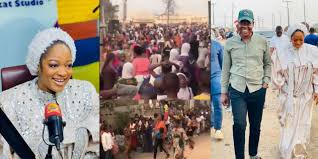
 Top Stories14 hours ago
Top Stories14 hours agoBreaking: Ibadan Stampede: Court Orders Remand Of Ooni’s Ex-Wife, School Principal
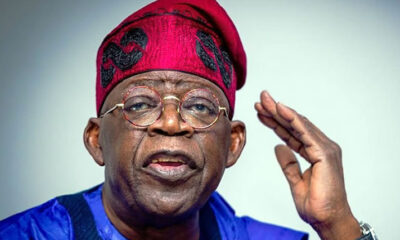
 Top Stories19 hours ago
Top Stories19 hours agoI’m not prepared to downsize my cabinet — Tinubu
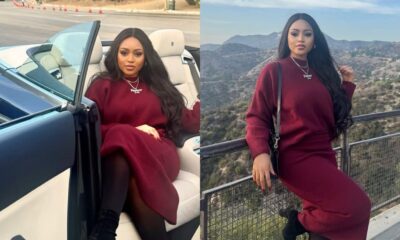
 Entertainment16 hours ago
Entertainment16 hours agoRegina Daniels reveals the best way to predict one’s future as she shares more photos from her vacation
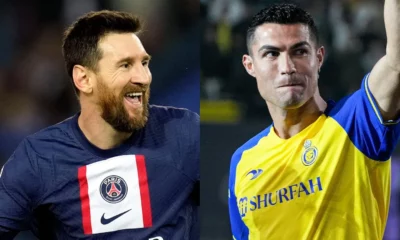
 Sports16 hours ago
Sports16 hours agoGOAT: Who said Messi is better than me – Cristiano Ronaldo
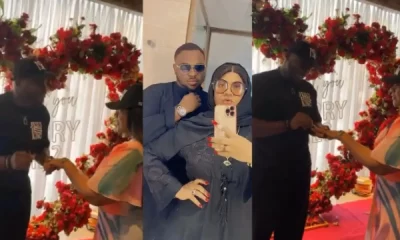
 Entertainment15 hours ago
Entertainment15 hours agoNkechi Blessing gets engaged to younger lover, Xxssive [VIDEO]
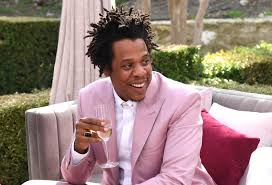
 Entertainment16 hours ago
Entertainment16 hours agoJay-Z has no ‘plans to show loyalty to longtime friend Diddy’ as he battles r@pe allegation

 News19 hours ago
News19 hours agoBREAKING: “I Have No Regrets” – Tinubu Defends Fuel Subsidy Removal Amid Economic Hardship [VIDEO]

 Entertainment16 hours ago
Entertainment16 hours agoSelena Gomez flashes gorgeous $1M engagement ring






